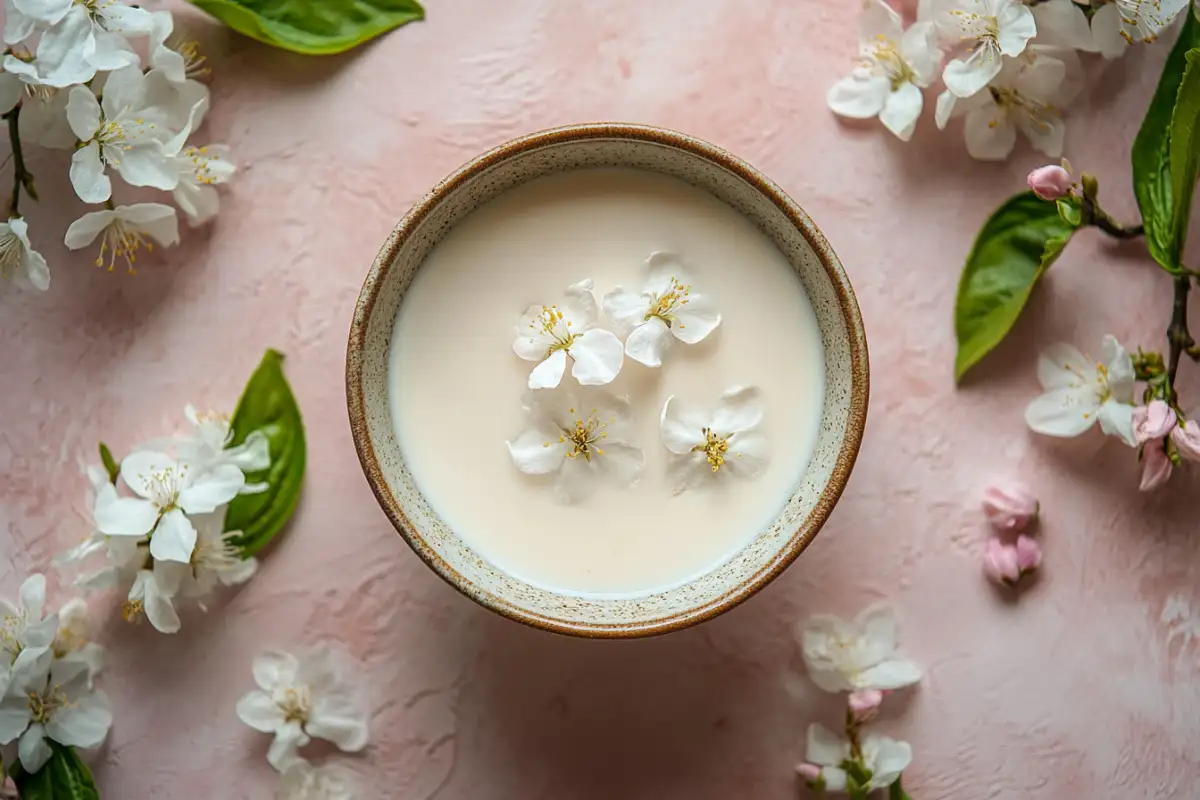Discover if jasmine tea pairs well with milk and learn how to create a smooth, delightful cup.
Understanding The Traditional Approach
Is jasmine tea good with milk? Many tea drinkers ask this because jasmine tea often shines on its own. Traditionally, jasmine tea is served pure. However, tastes evolve. Accordingly, adding milk can create a creamy, soothing cup. Still, this shift from custom prompts many questions.
What Is Jasmine Tea?
Jasmine tea is typically a green tea base scented with jasmine flowers. Initially, artisans lay jasmine blossoms over dried tea leaves. Afterward, the flowers impart their gentle fragrance. Comparatively, jasmine tea is delicate, floral, and subtly sweet. Because of this, its aroma enchants tea lovers worldwide.
Traditional Preferences
Traditionally, jasmine tea is served plain. Indeed, many cultures in East Asia enjoy it without additions. Generally, the subtle floral flavor can diminish if you add dairy. Conversely, Western tea traditions often add milk to black tea blends. Thus, the idea of pairing milk with jasmine tea emerged as cultural tastes mixed. Still, some purists say this addition masks the tea’s natural charm.
Flavor Profile and Sensory Experience
Is jasmine tea good with milk? The answer depends on personal preference. Comparatively, jasmine tea is light and floral. Meanwhile, milk is creamy and rich. When blended, these qualities can yield a balanced beverage. Furthermore, certain palates may savor this combination’s unique depth.
Flavor Elements To Consider
Jasmine tea’s fragrance is its signature trait. Particularly, the floral notes uplift the green tea base. Conversely, milk adds sweetness and creaminess. Consequently, when combined, the floral aroma may soften. While this can dampen the jasmine’s distinct essence, it can also create a rounder, smoother taste. Eventually, you may find the tea’s body enhanced, making it feel richer on the palate.
The Creamy Twist
Milk contributes a velvety texture that many find comforting. Because jasmine tea’s bitterness is mild, adding dairy rarely leads to an unpleasant aftertaste. Rather, the creaminess can harmonize with the tea’s floral sweetness. Nonetheless, achieving the right balance is crucial. If you add too much milk, the tea’s fragrance may fade. Meanwhile, too little milk may not produce the desired creaminess.
Health Benefits and Nutritional Aspects
Many drink jasmine tea for potential health benefits. Basically, jasmine tea retains green tea’s antioxidants and polyphenols. These compounds help support wellness. Is jasmine tea good with milk? Nutritionally, adding milk offers extra protein and calcium. However, milk may slightly alter the absorption of some antioxidants. Nevertheless, this effect is minor and should not deter you if you love creamy beverages.
Antioxidants and Wellness in Jasmine Tea
Jasmine tea’s antioxidants can help protect cells from damage. Because green tea is rich in catechins, it can positively impact heart health and metabolism. Furthermore, jasmine’s aromatic oils may help relaxation. Altogether, jasmine tea supports a balanced lifestyle. Conversely, if you add milk, these health properties remain. Still, the taste and nutrient profile will differ.
Nutritional Considerations of Milk in Tea
Adding dairy contributes calcium, protein, and fats to your cup. Indeed, these nutrients can support bone health and satiety. However, if you are lactose-intolerant, consider plant-based alternatives. Eventually, you might try almond or oat milk for a gentler, lactose-free option. Consequently, you enjoy creaminess without digestive issues. Altogether, choose what fits your dietary needs.
Best Practices for Brewing
Brewing jasmine tea with milk requires finesse. Initially, you must select quality tea leaves. Afterward, pay attention to water temperature and steeping times. Basically, this ensures the tea’s delicate flavors remain intact before milk joins the party.
Choosing Premium Jasmine Tea
For the best result, choose top-grade jasmine tea. Indeed, higher-quality leaves produce a more fragrant cup. Consequently, the sweetness and floral aroma stand up better against milk. Comparatively, lower-quality teas may taste weak or bitter when combined with dairy. Thus, always invest in fresh, aromatic jasmine tea.
Brewing Parameters for Perfect Flavor
To maintain jasmine tea’s delicate nature, brew at around 175°F to 185°F (79°C to 85°C). Steep for about 2-3 minutes. However, do not over-steep. Otherwise, the tea can turn bitter. Because jasmine tea is mild, controlling these factors ensures the milk blends smoothly afterward. Eventually, you can adjust steeping time based on personal taste.
Finding the Right Milk-to-Tea Ratio
Is jasmine tea good with milk? If you add too much milk, you may lose the jasmine aroma. If you add too little, you might barely notice a difference. Initially, start with a small splash of milk. Taste and adjust. Comparatively, you might try one part milk to three parts tea. Consequently, this balance maintains both floral notes and creaminess.
Popular Recipes and Variations
With creativity, is jasmine tea good with milk? can yield delicious results. Jasmine milk tea lattes and bubble tea drinks showcase this combination. Furthermore, pairing with sweets can enhance the overall experience.
Jasmine Tea Latte with Dairy or Plant-Based Milk
A jasmine tea latte involves steeping jasmine tea leaves in hot water, then adding steamed milk. Undoubtedly, frothed milk enhances texture. Meanwhile, sweeteners like honey or syrup can complement the floral notes. Eventually, consider trying almond or oat milk for a vegan twist.
Jasmine Milk Boba Tea Creations
Bubble tea shops frequently use jasmine tea as a base. Adding milk and tapioca pearls creates a trendy, creamy treat. Indeed, this variation is popular among younger tea drinkers. Consequently, jasmine milk boba tea is both visually appealing and delightful. Because it’s customizable, you can add fruit syrups or jellies.
Accompaniments That Enhance the Experience
Pairing jasmine milk tea with desserts can magnify enjoyment. For instance, buttery pastries or floral macarons complement the tea’s delicate nature. Likewise, fruit tarts or a mild sponge cake work well. Comparatively, avoid overly rich or chocolate-heavy treats that can overshadow the tea’s gentle fragrance.
Is jasmine tea good with milk? Choosing the Right Milk Options
When deciding which milk to use, consider flavor, texture, and dietary needs. Because milk types vary in taste and consistency, choose one that aligns with your preferences.
Whole Milk vs. Skim Milk vs. Cream
Whole milk adds a full-bodied richness. Consequently, it may slightly overshadow delicate jasmine notes. Conversely, skim milk is lighter and less creamy. Basically, it adds subtle smoothness without dominating. Alternatively, cream provides a luxurious mouthfeel. However, it can overpower the tea’s floral profile if not used sparingly.
Almond, Soy, Oat, and Coconut Milk Alternatives
Plant-based milks add unique flavors. Almond milk brings a nutty nuance that can blend nicely with jasmine’s floral essence. Soy milk has a neutral taste and creamy texture. Oat milk is sweet and smooth, enhancing the tea’s gentle aroma. Coconut milk introduces a tropical flair. Ultimately, choose a milk alternative that complements rather than competes.
Flavor Compatibility and Personal Preference
People’s palates vary. Is jasmine tea good with milk? For some, dairy or plant-based options improve the experience. Others prefer pure jasmine tea. Therefore, experiment with different milks. Eventually, you will find the best fit. Indeed, personal taste is the ultimate guide.
Is jasmine tea good with milk? Expert Tips and Recommendations
Tea experts recommend that you keep balance in mind. Is jasmine tea good with milk? Start by tasting pure jasmine tea. Then, add a bit of milk to see if it elevates or diminishes the flavor.
What Tea Sommeliers Say
Tea sommeliers appreciate jasmine tea’s subtlety. Consequently, they advise caution when adding milk. Generally, experts suggest using only a small amount of warm, lightly frothed milk. This approach preserves the tea’s floral bouquet. Meanwhile, it adds a velvety texture. Eventually, you might find that a half teaspoon of sweetener also rounds out the flavor.
Adjusting Sweetness and Aroma
If you find the taste lacking, add a mild sweetener such as honey. Consequently, the floral notes may become more pronounced. Alternatively, a bit of vanilla syrup enhances creaminess and aroma. Because jasmine tea is delicate, do not overdo it. Equally important, keep the focus on the tea’s natural fragrance.
Preventing Unpleasant Aftertastes
To avoid bitterness, do not over-steep the tea. Additionally, ensure your milk is fresh. Stale milk can introduce off-flavors. Furthermore, keep your brewing utensils clean. Consequently, these steps prevent any unpleasant aftertaste. Eventually, you enjoy a flawless cup every time.
Is jasmine tea good with milk? Practical Considerations and Storage
When preparing jasmine milk tea, consider freshness and storage. Because jasmine tea relies on aroma, proper handling preserves its qualities.
Maintaining Freshness and Fragrance
Store jasmine tea leaves in an airtight container, away from light and moisture. Eventually, exposure to air weakens its fragrance. Furthermore, using older leaves results in a duller cup. Basically, fresh leaves yield a more vibrant flavor that can stand up to milk. By preserving quality, you ensure a delightful drinking experience.
Storage Recommendations for Milk Tea
Once you mix milk with jasmine tea, enjoy it promptly. Indeed, leaving milk tea out too long can affect taste and safety. If you must store it, refrigerate it in a sealed container for no more than a day. Consequently, this prevents spoilage. Nevertheless, freshly brewed is best.
Hot vs. Iced Jasmine Milk Tea
Is jasmine tea good with milk? Hot or iced? Both versions can be wonderful. Hot jasmine milk tea feels comforting and soothing. Conversely, an iced version provides a refreshing treat. Add ice cubes after brewing to prevent dilution. Comparatively, iced jasmine milk tea can be a perfect summertime indulgence.
Is jasmine tea good with milk? Embracing Creativity
Innovation keeps tea rituals exciting. Eventually, adding spices, syrups, and even seasonal twists can elevate your jasmine milk tea.
Using Flavored Syrups or Spices
Try infusing your jasmine tea with cardamom or cinnamon. Consequently, the milk blends seamlessly with warm spices. Likewise, vanilla or lavender syrup can enhance the floral backdrop. However, use these additions sparingly. Otherwise, you might overshadow the tea’s signature jasmine aroma.
Iced Jasmine Milk Tea for Summer
For warm days, brew jasmine tea, then chill it. Add milk and perhaps a hint of sweetness. Serve over ice. Undoubtedly, this creates a delightful, cooling beverage. Additionally, garnish with fresh mint leaves. Indeed, iced jasmine milk tea can impress guests at summer gatherings.
Jasmine Milk Tea Puddings and Cakes
Experiment beyond beverages. Indeed, jasmine milk tea can inspire desserts. For instance, incorporate brewed jasmine milk tea into custards or puddings. Consequently, the subtle floral notes infuse your sweets. Similarly, use jasmine milk tea to flavor cake frostings. Eventually, you can create a unique culinary signature.
Is jasmine tea good with milk? Final Thoughts
Is jasmine tea good with milk? The answer depends on personal preference. Some cherish the tea’s delicate purity, while others enjoy the creamy layer milk provides. Indeed, jasmine tea’s mild character allows milk to blend without harsh clashes. If you carefully balance tea and milk proportions, you can create a harmonious, soothing beverage.
Eventually, the best approach is experimentation. Start with quality jasmine tea and add a splash of milk. Consequently, adjust until you discover your perfect cup. Afterward, try plant-based milks, sweeteners, and spices. Ultimately, there is no right or wrong answer. Is jasmine tea good with milk? It can be, if it pleases your palate.
Frequently Asked Questions
Jasmine tea can be enjoyed with or without milk. Traditionally, it’s served plain. However, if you prefer a creamier, richer taste, adding milk is acceptable. Adjust the ratio to ensure the tea’s floral notes remain evident.
Many elements complement jasmine tea’s delicate flavor. Light sweeteners like honey or agave work well. Plant-based milks, vanilla syrups, and mild spices also blend seamlessly. Equally, pairing the tea with subtle pastries enhances the experience.
Delicate green and white teas, including jasmine, typically do not require milk. However, that does not forbid experimentation. Black teas and robust blends usually pair better with milk. Eventually, it’s a matter of taste.
Jasmine milk tea tastes floral, slightly sweet, and creamy. The milk rounds out the tea’s aroma, creating a smooth, rich texture. Altogether, it’s a balanced beverage that soothes and satisfies.

